
New FEGT Electronic Systems programme by UTAR
With the intention to promote UTAR’s new programme “Bachelor of Technology (Honours) in Electronic Systems” under Faculty of Engineering and Green Technology (FEGT), the FEGT Department of Electronic Engineering organised a webinar titled “Introduction to Electronic Systems” on 16 October 2020 via Microsoft Teams.
Present to deliver the talk was FEGT Department of Electronic Engineering Assoc Prof Ir Dr Yeap Kim Ho. The webinar was moderated by FEGT Department of Electronic Engineering Lecturer Dr Yew Tiong Keat and saw more than 60 participants.
According to FEGT lecturer Ts Dr Leong Kah Hon, the webinar was held to inform the public on the job prospects of this programme, as well as its demand from the local and international industry. He said, “The participants can obtain better ideas on the programme structure and the job opportunities available after graduation. The speaker will also share the demand and needs of the industry towards Electronic Systems graduate.”
The webinar was kick-started by Dr Yew with a brief introduction on all the programmes offered under FEGT. He told the participants that the new programme “Bachelor of Technology (Honours) in Electronic Systems” was first offered in 2019 by the Department of Electronic Engineering parked under FEGT.
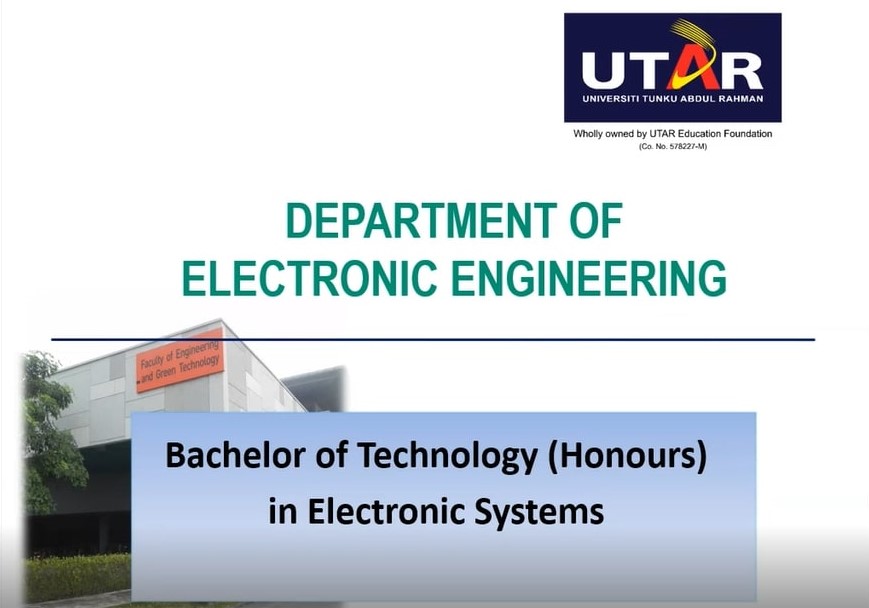
Bachelor of Technology (Honours) in Electronic Systems programme was first offered in 2019
After Dr Yew initiated the talk, Dr Yeap took over the virtual stage by introducing the Electrical and Electronics (E&E) sector, “Our life today is very different from the life decades ago as we are marching towards the Industrial Revolution 4.0. All those smart technologies and devices are changing the way we live, work and interact with one another. Behind this digital revolution, the E&E sector is the key driving force.”
Although Malaysia is famous for the exports of petroleum products, Dr Yeap told the participants that the E&E products was beyond the petroleum products and became Malaysia’s largest exports in 2019. “Surprisingly, compared to petroleum products which only contributed 7.25% to Malaysia’s 2019 export value, the E&E sector has contributed 37.78% (RM372.67billion) to Malaysia’s total Exports (RM986.4billion).”
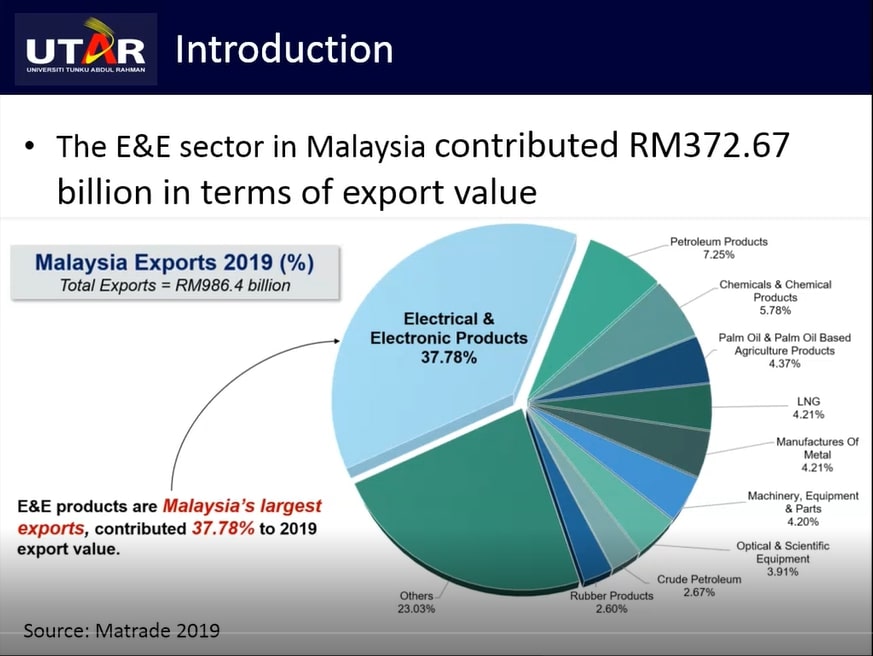
The chart showing the E&E sector as the largest exports in 2019
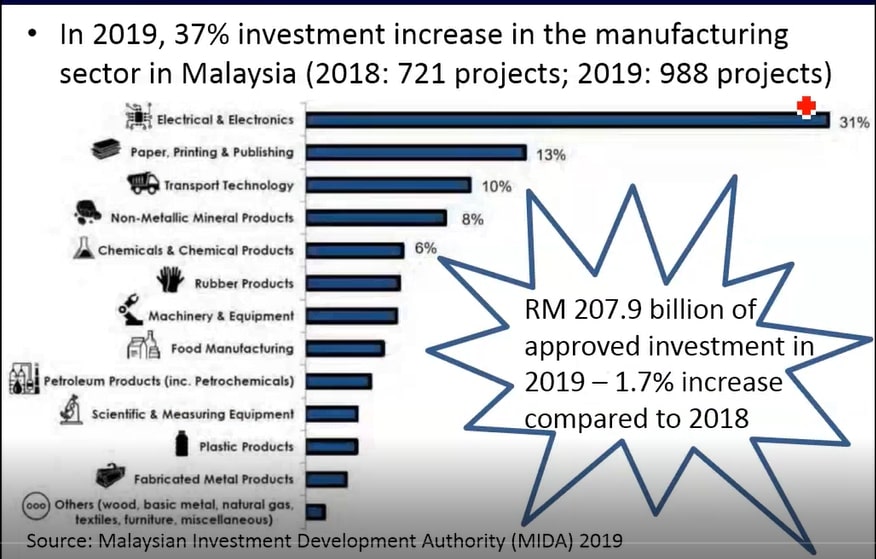
The chart showing the breakdown of manufacturing sectors in Malaysia that have attracted investment in 2019
Dr Yeap said, “Although we are undergoing the COVID-19 pandemic, the E&E market is estimated to be at $3055.3billion in 2020 and the world is projecting to reach $3699billion in 2023. In Malaysia alone, the E&E sector has contributed RM81billion to Malaysia’s Gross Domestic Product (GDP) last year.” Due to the rapid growth of the E&E sector in Malaysia, the employment rate in this sector has also increased gradually.” While presenting a chart regarding the employment rate in the E&E sector in Malaysia, Dr Yeap encouraged the students to enrol in UTAR’s new programme as there will be more job opportunities for specialists in electronic systems.
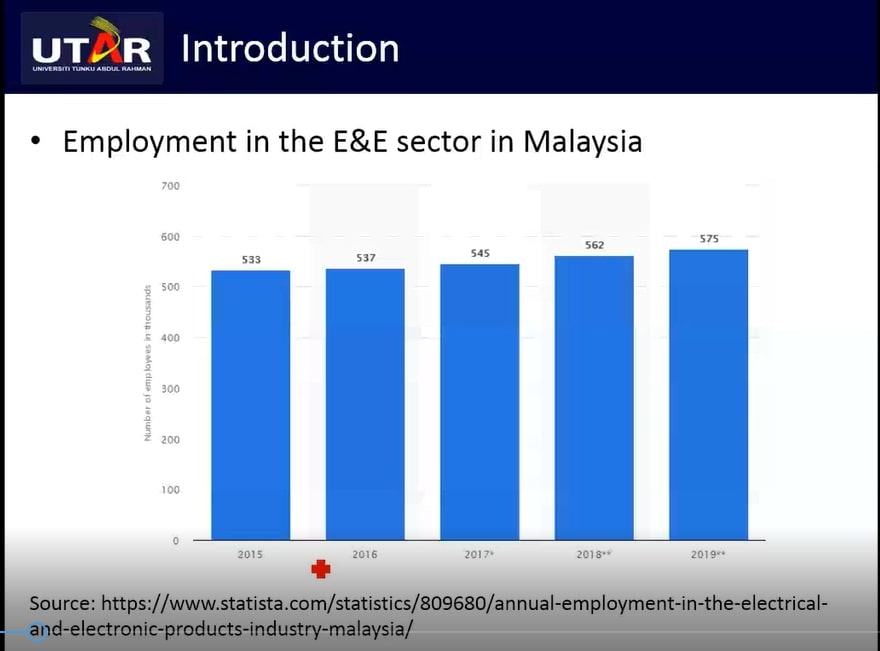
The chart showing the increment of employment rate in Malaysia’s E&E sector
In preparing the future human resources in E&E sectors, UTAR has decided to start a three-year programme of Bachelor of Technology (Honours) in Electronic Systems. The programme was approved by the Malaysian Qualifications Agency (MQA) and was credited by Malaysia Board Of Technologists (MBOT). The total fee of the programme is RM47,450 for Malaysians and RM63,250 for International students.
Dr Yeap also mentioned that work-based learning (WBL) mode is the feature of this programme. Under this WBL and industry-relevant structure, students only need to study at the University for two years, another one year lesson will take place while working in the industries. Eventually, this WBL’s feature allows students to accumulate their working experience while taking some courses in the industries.
Dr Yeap explained, “UTAR is offering two programme pathways under the Bachelor of Technology (Honours) in Electronic Systems programme. The WBL mode is for those who want to experience working life earlier. Lecturers from UTAR and mentors from the industries will be assigned to supervise the students together. On the other hand, the non-WBL pathway is for students who want to study in UTAR for three years. They could fully enjoy their three years of university life under this pathway.”
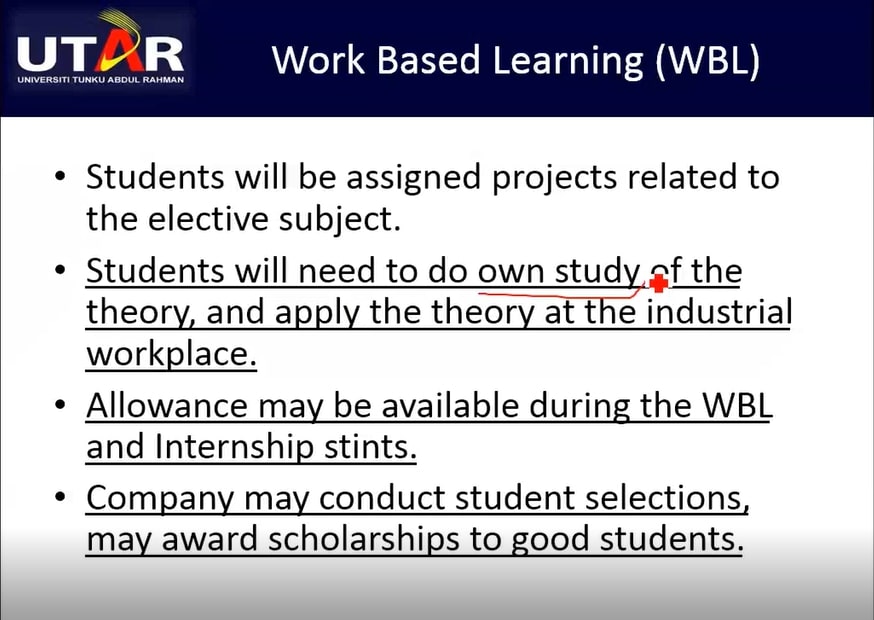
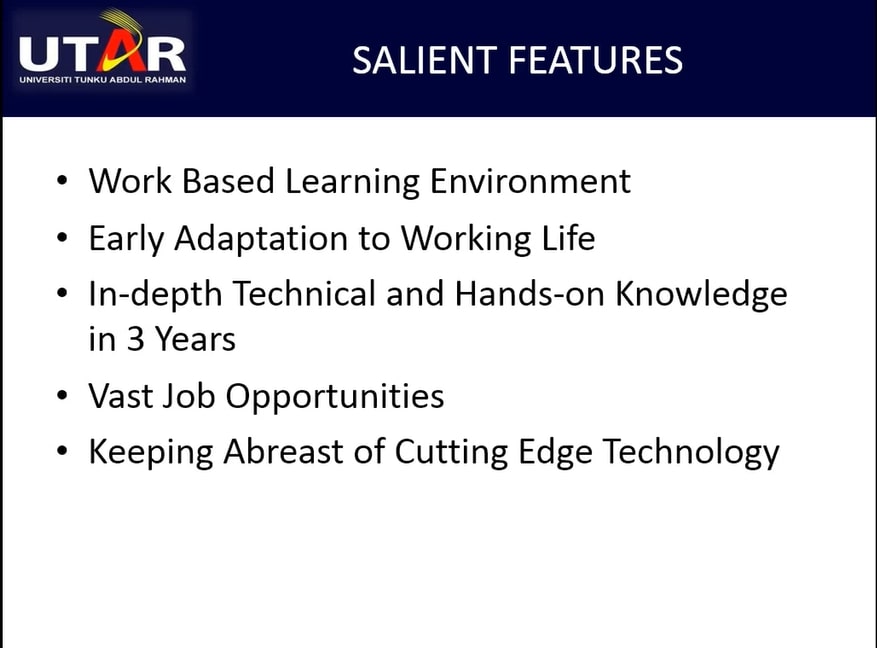
Dr Yeap explaining the work-based learning structure of Electronic Systems programme
The session was followed by a pre-recorded video session to students regarding a collaboration between Infineon and ViTrox with UTAR for the WBL mode offered under the Bachelor of Technology (Honours) in Electronic Systems programme. Electronic Systems’ students will be sent for training at the key companies, namely Infineon Technologies and Vitrox Corporation Berhad. The pre-recorded video saw President-cum-Managing Director of Infineon Technologies in Kulim Ng Kok Tiong and President-cum-CEO of Vitrox Corporation Berhad Chu Jenn Weng encouraging students to enrol in UTAR’s Bachelor of Technology (Honours) in Electronic Systems programme and sign for the WBL pathway.
The session ended with a Q&A session between the speaker and participants.
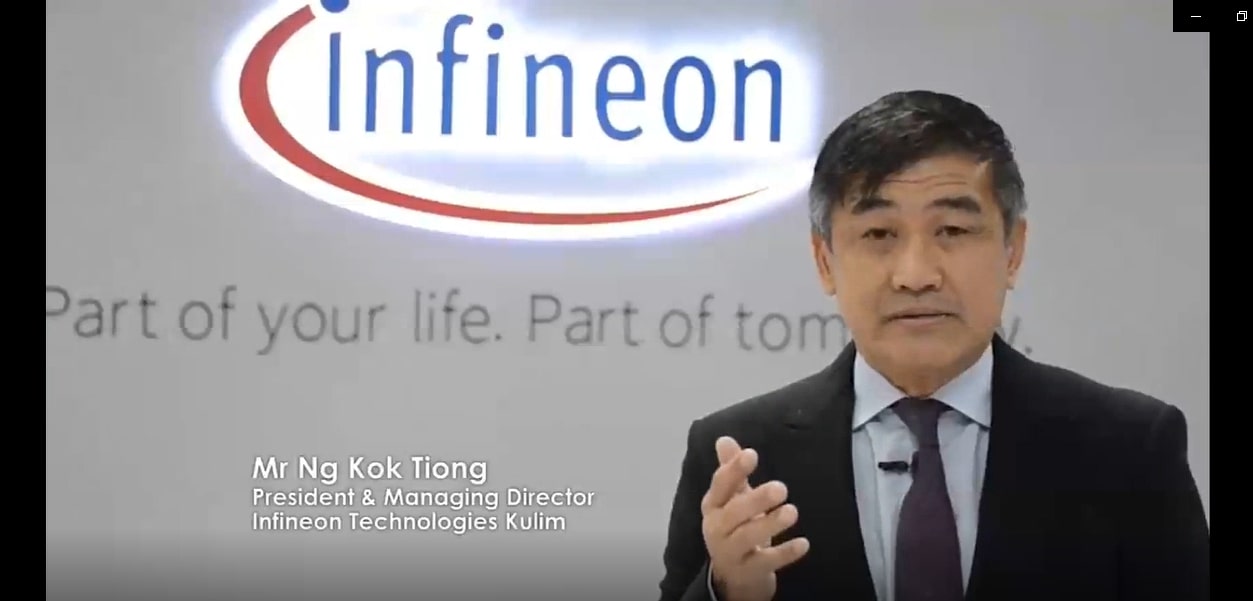
Ng encouraging student to enrol in the new programme and join Infineon for the WBL and internship stints
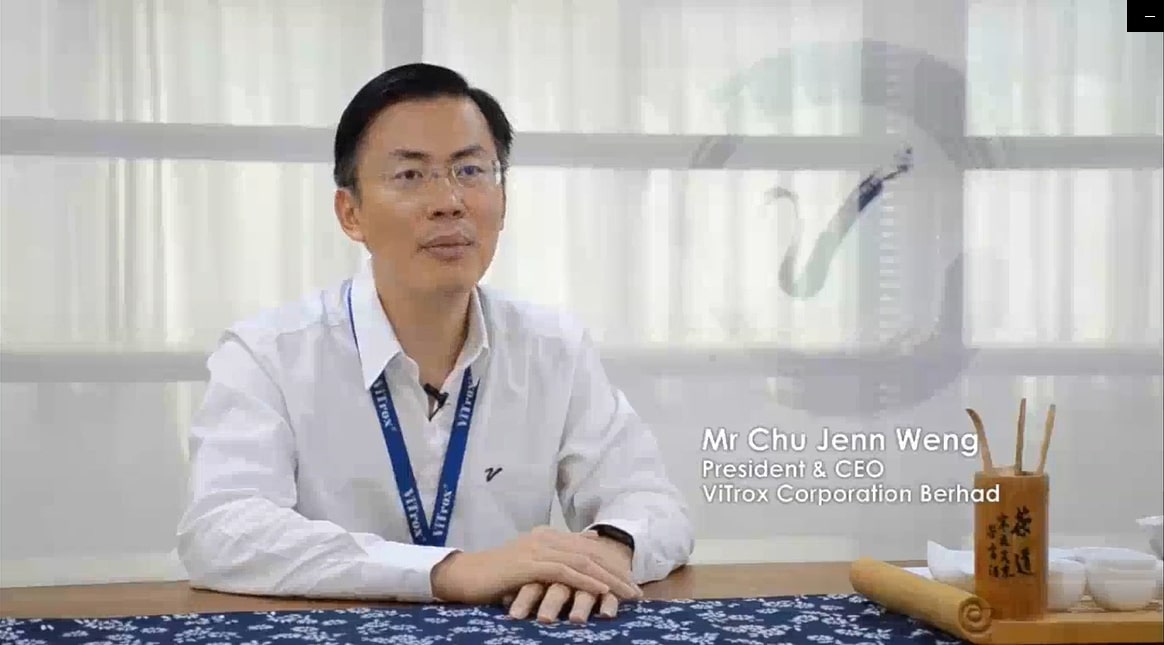
Chu in the pre-recorded video
© 2020 UNIVERSITI TUNKU ABDUL RAHMAN DU012(A).
Wholly owned by UTAR Education Foundation Co. No. 578227-M LEGAL STATEMENT TERM OF USAGE PRIVACY NOTICE